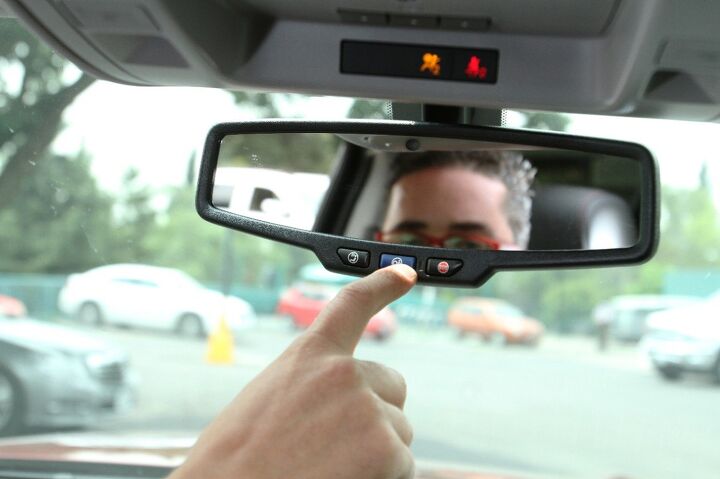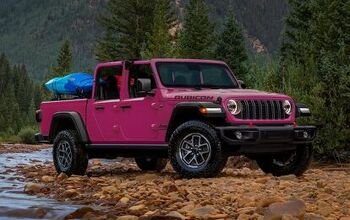TTAC News Round-up: GM Plans to Sell You Things Inside Your Own Car

General Motors is teaming up with IBM to implement Watson’s artificial intelligence so that it can advertise while you are trying to drive. Your dashboard is about to become a billboard.
That, Uber delivers a truckload of beer using a self-driving vehicle, Mini’s Countryman gains size and compatibility with electricity, and Hyundai’s earnings tank… after the break!
OnStar is getting an Advertising AI
The Detroit News reports that General Motors and IBM Corp. are partnering to produce the auto industry’s first cognitive mobility platform, allowing GM to send personalized marketing offers to millions of drivers beginning early next year.
“Personalized marketing” is code for rampant targeted advertising beamed directly into your car.
The companies said OnStar Go will use the artificial intelligence capabilities of IBM’s Watson — the computer that was a contestant on Jeopardy in 2011 — to offer deals and advice in the vehicle dashboard. GM says the system could help a driver avoid traffic, assist in paying for gas, or order a cup of coffee while en route to pick it up.
However, as none of those things are even remotely difficult or time consuming in the first place, this just seems like a good way to ensure OnStar users making use of specific products and brands. Initial partners include MasterCard, ExxonMobil, Glympse, iHeartRadio and Parkopedia. So expect to use your in-car payment methods to be MasterCard only and your fuel-finding app to recommend ExxonMobil stations above all others.
Watson will even be able to learn a driver’s preferences, and companies working with IBM and OnStar can tailor location-based offers to specific vehicles. The companies said the system would be available in more than 2 million vehicles in the United States that feature 4G LTE Wi-Fi hotspots by the end of 2017. It also will be available to millions of GM-brand app mobile devices.
World’s First: Uber drops off beer not already inside someone
Bloomberg is reporting that a tractor trailer full of beer drove itself down Colorado’s I-25 last week with nobody behind the wheel. Uber Technologies Inc. and Anheuser-Busch teamed up on the delivery, which they said is the first time a self-driving truck had been used to make a commercial shipment.
Escorted by the police, the 18-wheeler chugged along for 120 miles while a truck driver relaxed in the sleeper cab. The delivery is largely a publicity stunt to show the public that Otto, the self-driving vehicle group that Uber acquired in July, could successfully put an autonomous truck on public roads without it resulting in disaster.
“We wanted to show that the basic building blocks of the technology are here; we have the capability of doing that on a highway,” said Lior Ron, the president and co-founder of Uber’s Otto unit. “We are still in the development stages, iterating on the hardware and software.”
Anheuser-Busch estimates it could save $50 million a year in the U.S. if it deploys autonomous trucks across its distribution network — even if drivers continued to ride along and supplement the technology. Obviously that dollar figure would jump if they just laid everyone off.
That won’t happen just yet. The truck can only drive autonomously on the highway, meaning drivers shouldn’t have to worry about finding a new profession anytime soon. “The focus has really been and will be for the future on the highway,” Ron said. “Over 95 percent of the hours driven are on the highway. Even in the future as we start doing more, we still think a driver is needed in terms of supervising the vehicle.”
Mini’s not-so-small Countryman goes plug-in hybrid
As previously announced, the new 2017 Mini Countryman is available as a plug-in hybrid for the first time. Mini is also offering up their all-wheel-drive as optional for every drivetrain. But the AWD system on the terribly named Cooper S E Countryman ALL4 hybrid will differ from the rest. Since the three-cylinder combustion engine powers the front wheels and the electric motor works on the rear, only one system is active at any time until conditions require all-wheel drive. The car operates in three distinct modes, one of which will hold the battery at a 90 percent charge until the driver wants to use it.
The Countryman’s length has stretched an additional 7.7 inches, and its width has increased by 1.3 inches. The base front-wheel-drive Minis come with a 134 horsepower 1.5-liter turbocharged three-cylinder mated to a six-speed manual or six-speed automatic transmission. More expensive Cooper S crossovers have the option of an eight-speed auto and a 189 hp 2.0-liter turbo four-cylinder power source.
The top-trim hybrid Mini produces 221 horsepower and 284 pound-feet of torque, but manual transmissions go out the window when you go electric. Under the best of conditions, the hybrid can travel 24 miles on electric power alone, though that mode is limited to a friendly 77 mph. Recharging the lithium-ion batteries at a 3.6-kilowatt wall box takes roughly the same time as a long movie. Charging using a standard 110-volt outlet will be a movie marathon, however.
Hyundai’s third quarter is even worse than expected
Hyundai Motor’s third-quarter profit fell to its lowest point in nearly seven years, well below already low forecasts. Fortune said the company attributes the poor showing to production-crippling strikes and weak demand in emerging markets.
South Korea’s largest automaker said its July-September earnings fell 10 percent from a year earlier to 1.06 trillion won ($937 million). Analysts had forecast 1.3 trillion won in earnings according to FactSet, a financial data provider.
Hyundai said its sales in January-September declined 2 percent from the year before, falling both at home and overseas. With the sport utility vehicle market growing everywhere, Hyundai has had difficulties producing SUVs and crossovers. They’ve also had difficulty with production in general.
Workers walked out of annual wage negotiations for 212 hours, from July to September, severely disrupting manufacturing to the tune of 95,000 vehicles.
[Images: General Motors; Uber; BMW Group; Hyundai Motors]

A staunch consumer advocate tracking industry trends and regulation. Before joining TTAC, Matt spent a decade working for marketing and research firms based in NYC. Clients included several of the world’s largest automakers, global tire brands, and aftermarket part suppliers. Dissatisfied with the corporate world and resentful of having to wear suits everyday, he pivoted to writing about cars. Since then, that man has become an ardent supporter of the right-to-repair movement, been interviewed on the auto industry by national radio broadcasts, driven more rental cars than anyone ever should, participated in amateur rallying events, and received the requisite minimum training as sanctioned by the SCCA. Handy with a wrench, Matt grew up surrounded by Detroit auto workers and managed to get a pizza delivery job before he was legally eligible. He later found himself driving box trucks through Manhattan, guaranteeing future sympathy for actual truckers. He continues to conduct research pertaining to the automotive sector as an independent contractor and has since moved back to his native Michigan, closer to where the cars are born. A contrarian, Matt claims to prefer understeer — stating that front and all-wheel drive vehicles cater best to his driving style.
More by Matt Posky
Latest Car Reviews
Read moreLatest Product Reviews
Read moreRecent Comments
- Theflyersfan I used to love the 7-series. One of those aspirational luxury cars. And then I parked right next to one of the new ones just over the weekend. And that love went away. Honestly, if this is what the Chinese market thinks is luxury, let them have it. Because, and I'll be reserved here, this is one butt-ugly, mutha f'n, unholy trainwreck of a design. There has to be an excellent car under all of the grotesque and overdone bodywork. What were they thinking? Luxury is a feeling. It's the soft leather seats. It's the solid door thunk. It's groundbreaking engineering (that hopefully holds up.) It's a presence that oozes "I have arrived," not screaming "LOOK AT ME EVERYONE!!!" The latter is the yahoo who just won $1,000,000 off of a scratch-off and blows it on extra chrome and a dozen light bars on a new F150. It isn't six feet of screens, a dozen suspension settings that don't feel right, and no steering feel. It also isn't a design that is going to be so dated looking in five years that no one is going to want to touch it. Didn't BMW learn anything from the Bangle-butt backlash of 2002?
- Theflyersfan Honda, Toyota, Nissan, Hyundai, and Kia still don't seem to have a problem moving sedans off of the lot. I also see more than a few new 3-series, C-classes and A4s as well showing the Germans can sell the expensive ones. Sales might be down compared to 10-15 years ago, but hundreds of thousands of sales in the US alone isn't anything to sneeze at. What we've had is the thinning of the herd. The crap sedans have exited stage left. And GM has let the Malibu sit and rot on the vine for so long that this was bound to happen. And it bears repeating - auto trends go in cycles. Many times the cars purchased by the next generation aren't the ones their parents and grandparents bought. Who's to say that in 10 years, CUVs are going to be seen at that generation's minivans and no one wants to touch them? The Japanese and Koreans will welcome those buyers back to their full lineups while GM, Ford, and whatever remains of what was Chrysler/Dodge will be back in front of Congress pleading poverty.
- Corey Lewis It's not competitive against others in the class, as my review discussed. https://www.thetruthaboutcars.com/cars/chevrolet/rental-review-the-2023-chevrolet-malibu-last-domestic-midsize-standing-44502760
- Turbo Is Black Magic My wife had one of these back in 06, did a ton of work to it… supercharger, full exhaust, full suspension.. it was a blast to drive even though it was still hilariously slow. Great for drive in nights, open the hatch fold the seats flat and just relax.Also this thing is a great example of how far we have come in crash safety even since just 2005… go look at these old crash tests now and I cringe at what a modern electric tank would do to this thing.
- MaintenanceCosts Whenever the topic of the xB comes up…Me: "The style is fun. The combination of the box shape and the aggressive detailing is very JDM."Wife: "Those are ghetto."Me: "They're smaller than a Corolla outside and have the space of a RAV4 inside."Wife: "Those are ghetto."Me: "They're kind of fun to drive with a stick."Wife: "Those are ghetto."It's one of a few cars (including its fellow box, the Ford Flex) on which we will just never see eye to eye.






































Comments
Join the conversation
Many states are like Missouri and have multi-tiered beer distribution. Producers can't distribute or retail. Distributors are a protected monopoly with territories. They have a good racket going with lobbyists and the works. No self driving truck is ever going to deliver beer in Missouri.
We don't even let the dealer put their sticker on the car unless they opt to pay us for the advertising. None have agreed to pay us so we have no stickers on the cars.